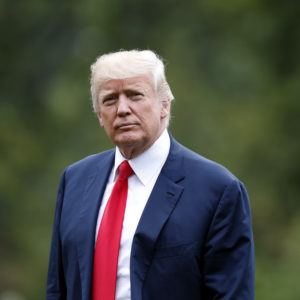In 1925, John Maynard Keynes famously wrote a scathing critique of Churchill’s economic policies in a book titled “The Economic Consequences of Mr. Churchill.” He did so in response to Churchill’s disastrous decision as Chancellor of the Exchequer to return Britain to the gold standard at too high an exchange rate. That decision is now generally accepted to have contributed importantly to the depth of Britain’s economic depression in the 1930s.
Judging by President Trump’s highly unorthodox economic policies, one has to wonder whether a similarly titled-book about his economic policies might not be penned now by some academic scribbler. This is not simply because the likely adverse economic consequences of his singularly ill-timed budget policies are in plain sight. It is also because the fundamental conflicts between his trade and budget-policies risk leading the world down the path to the destructive beggar-thy-neighbor policies of the 1930s.
The last thing a U.S. economy close to full employment and with rising inflationary expectations now needs is an expansionary budget policy, yet that is precisely what the Trump administration has chosen to do. According to IMF estimates, Trump’s $1.5 trillion unfunded tax cut over the next decade, together with Congress’ $300 billion public spending increase over the next two years, will provide the United States with a fiscal stimulus amounting to around 0.75 percent of GDP in both 2018 and 2019.
Trump’s expansionary budget policy at this late stage in the economic cycle is bound to add considerable pressure on the Federal Reserve to raise interest rates to prevent the U.S. economy from overheating. It is also all too likely to bring out the bond vigilantes of yesteryear should inflation gather momentum and the Federal Reserve be perceived to be behind the interest rate curve. This is especially the case at a time that a U.S. economy close to its potential is receiving a strong boost from the combination of still every low interest rates, buoyant equity and housing market prices, and a weak dollar.
In putting the economy on the path to higher interest rates than the Federal Reserve is presently anticipating, the administration seems to have forgotten the searing 2008-2009 experience of how rising interest rates led to the bursting of the U.S. housing and credit market bubbles. This is all the more to be regretted considering how much more pervasive asset price bubbles and credit risk mispricing are in today’s global economy than they were a decade ago.
It is not simply that global equity valuations today are still at levels experienced only three times over the last 100 years or that bubbles characterize many important housing markets around the world. It is that global financial market institutions have exposed themselves to considerable risk by lending vast amounts of money at very low interest rates to borrowers of dubious creditworthiness who are apt to default when interest rates keep rising.
Seemingly, not only has the administration forgotten the lessons of 2008-2009, it has also forgotten the lessons with beggar-thy-neighbor policies of the 1930s and with the U.S. twin deficit problems of the 1980s. Otherwise it would be difficult to understand how it is abrogating the U.S. leadership role of the last 70 years for open global markets in favor of an American First policy. It would also be difficult to grasp how it is pursuing a budget policy in direct conflict with the objective of reducing the U.S. trade deficit.
Equally troubling for the maintenance of open global markets is the administration’s willful disregard of the basic economic principle that a country’s trade deficit is arithmetically the difference between its savings and investment rates. This exposes us to the all too real risk that the administration will double down on its policy of imposing import tariffs to reduce the trade deficit when that deficit widens as a result of an increased budget deficit. That in turn would be bound to invite retaliation by our trade partners, which could very well disrupt global supply chains.
Some years ago, the cartoonist of the London Times was asked what he thought of the election of an angular-faced Edward Heath as British prime minister. He replied that as a private citizen he mourned, but as a cartoonist he rejoiced. Sadly, I feel the same way about the Trump administration having thrown caution to the wind in their design of economic policy. As a private citizen, I mourn about the unnecessary economic pain this will inflict on the U.S. citizenry. However, as an economist, I rejoice that the economics profession will be vindicated by its general skepticism about those policies.

